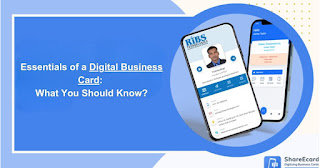Essentials of a Digital Business Card: What You Should Know?
In our rapidly evolving digital age, traditional business
cards are gradually fading from the networking scene. Replacing them is the
innovative and environment-friendly "digital business card." But what
exactly is a digital business card, and why might you need one? In this post,
we'll uncover the essentials of a digital business card and explain why they
are becoming the new standard for professionals worldwide.
What is a Digital Business Card?
A digital business
card is a digital file or platform that contains essential contact
information and business details, similar to a traditional business card.
However, it's not limited by physical constraints. It can be shared through
email, social media, or even QR codes and can be updated in real-time.
Why Shift to Digital?
- Sustainability:
No paper waste, reducing your carbon footprint.
- Flexibility:
Update your details anytime without reprinting.
- Cost-effective:
Save on printing and distribution costs.
- Increased
Engagement: Incorporate interactive elements such as videos or
clickable links.
Essential Features of a Digital Business Card:
a) Design and Branding
The design should be professional, reflecting your brand's
aesthetics. This means consistent fonts, colors, and logo placements. Remember,
the digital format offers more room for creativity, but simplicity remains key.
b) Contact Information
This includes:
- Name
- Job
title
- Company
name
- Phone
number
- Email
address
- Website
or portfolio
c) Social Media Links
Incorporate icons that link directly to your LinkedIn,
Twitter, Instagram, or other relevant social media platforms.
d) Multimedia
Add videos, GIFs, or slideshows to showcase your work, offer
testimonials, or provide a brief introduction.
e) QR Code
A personalized QR code allows for quick sharing and
scanning. When someone scans the code, they can instantly save your details.
f) Call-to-Action (CTA)
A CTA button like “Call Now”, “Email Me”, or “View
Portfolio” can help prompt immediate interaction.
g) Analytics Integration
Monitor how many times your card has been viewed, which
links are clicked the most, and other engagement metrics.
Sharing Your Digital Business Card
You can share your card through various means:
- Email
Signatures: Embed it as a link or QR code.
- Social
Media Bios: A quick way for followers to get your professional
details.
- Networking
Platforms: Share on platforms like LinkedIn during interactions.
- QR
Code Stickers: Place them on your physical products or at your
workspace.
Safety and Privacy
Ensure your digital business card provider uses secure
hosting and gives you control over your data. Regularly update your card to
remove any outdated information or links.
Adaptability for Different Platforms
A good digital card should be responsive, meaning it should
display well on desktops, tablets, and smartphones.
Conclusion
The digital business card is not just a trend; it's a
reflection of our evolving digital age. It combines the best of traditional
networking with the vast potential of the digital realm. By ensuring your card
is well-designed, up-to-date, and easy to share, you can make a lasting
impression on your professional connections.
Remember, the digital card doesn't just represent you; it is you in the virtual world. So make it count!




Comments
Post a Comment